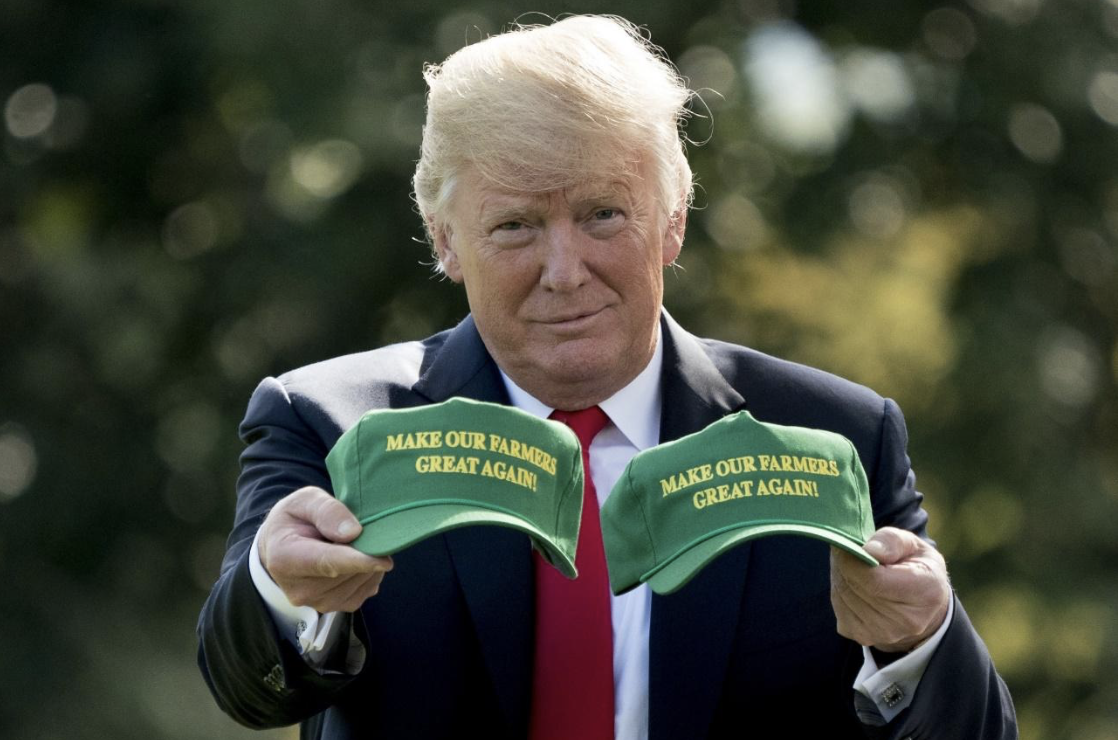DHARI ALDURAIBI WRITES—In his escalating trade war with China, President Trump has recently placed tariffs on roughly $500 billion in Chinese goods, sparking retaliation from Beijing, which has placed its own tariffs on American agricultural products, including soybeans. A majority of America’s soybean farmers are located in pro-Trump states like Nebraska and Iowa.
The White House has responded cautiously, pledging roughly $12 billion to help soybean cultivators, but this may fall short, depending on whether the trade war between the two countries continues.
President Trump argues that the price of soybeans has actually increased since he initiated his trade war with China. “And soybeans are going up, and things are going up,” he stated at a recent press conference. “And we’ve had very little hurt from what I’ve done. In fact, the markets have gone up, and the farmers are going to do great,” he added.
Contrary to the president’s statement, the price of soybeans has fallen approximately 12% since China placed its retaliatory tariff. In fact, just last week, the price for soybeans closed 12 cents lower, a problem which reflects a decreased demand for the crop even though soybean farmers planted an abundance.
It is difficult to say whether the tariffs have had their intended effect of forcing China to reexamine its trade imbalance with the United States. Indeed, Chinese officials have had strong words for Trump, with Vice Minister of Agriculture Han Jun even noting that American farmers may lose their position in the Chinese market, one that these farmers have worked decades to solidify. Han also stated that future tariffs on Chinese products could force their country to place extra duties on a list of 387 other agricultural products,including: coffee, vegetables, and vegetable oils, which amounted to $2.9 billion in total value in 2017.
Some analysts claim that China will ultimately regret its decision to slap tariffs on soybeans because the nation will have trouble finding an alternative supplier. China uses most of its soybeans to feed livestock like pigs and chickens, which are then used to feed the population.
Chinese farmers have also struggled to meet the growing demand, even with the steps they’ve taken to increase supply. Many experts believe that the rise in soybean prices, which have already hurt some Chinese companies, could ripple through the Chinese economy, perhaps causing other industries’ prices to rise.
Yet Trump has expressed confidence that he is winning the trade war, assuring soybean farmers that he is looking out for their best interests. While many soybean farmers have supported Trump and his trade war, some have not. “I don’t care what aid they give us,” stated Merlin Radar, a soybean farmer of more than 60 years, “We don’t want aid. We want trade.” Though Radar remains a Trump supporter, his sentiment is one that other soybean agriculturists share.
For now, many of President Trump’s supporters remain committed to his policy, although the tide might turn as Christmas approaches. Much of the 2018 soybean crop has already been sold, when prices were higher. But if the trade war continues into 2019, it is likely to have a negative impact on soybean prices, potentially putting many soybean agriculturists out of business.
“Levying additional tariffs will cause a great decrease in exports of U.S. agricultural products to China. But the impact on China is very limited, due to the diversified import sources,” Han Jun, Chinese Vice Minister of Agriculture said.
Given the growing economic damage that President Trump’s tariffs are likely to inflict on the United States, along with its frayed relationship with China, many economists have urged the President to back off . Some Republican Senators, including Ben Sasse (R) of Nebraska, have openly criticized the tariffs, as has Chuck Grassley of Iowa (R), who has signaled his support for farmers and ranchers. Other Republicans have tempered their condemnation, stating that while they may not agree with the tariffs, they believe that the United States must counteract China’s unfair trade practices. Democrats, for their part, have expressed concern that the tariffs will do any good and will harm both American farmers and consumers.

Ironically, although the looming soybean crisis may rile some Trump supporters to vote against him in 2020, only 4 percent saw this as the most important issue in the November midterms.



Interesting article, very informative!
Thank you!